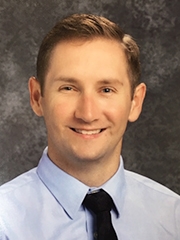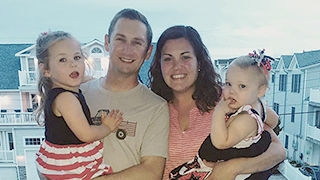Lessons Learned: Patrick’s Adult CHD Story
Published on
Published on
Born with congenital heart disease and successfully treated as a toddler, Patrick's childhood was like many other children — filled with fun, activities and sports. But a cardiac crisis at age 13 dramatically altered the trajectory of his life. A high school counselor helped Patrick regain control of his life and find a new purpose. At 33, Patrick is paying it forward by helping other teens, especially those managing a chronic disease.
 Patrick understands the value of sharing personal experiences. In his role as a high school counselor, he helps teens feel less alone and more equipped to face the challenges of their life, especially those dealing with a chronic disease.
Patrick understands the value of sharing personal experiences. In his role as a high school counselor, he helps teens feel less alone and more equipped to face the challenges of their life, especially those dealing with a chronic disease.
“Validation is a huge piece when you are helping people,” says Patrick. "By disclosing that you have a chronic condition and that it's not easy, you can help people understand they are not alone."
Patrick was born with three of the four heart defects that make up tetralogy of Fallot (TOF). He had:
He did not have an overriding aorta, the fourth defect associated with TOF.
Growing up, Patrick was an active kid despite his condition and the numerous surgeries he needed. At 18 months old, he had his first open heart surgery. By the time he entered school, he was well enough to join local teams for baseball, basketball and soccer.
When Patrick was 13, he passed out on a basketball court. After doctors evaluated him, they decided he needed an automatic implantable cardioverter-defibrillator (AICD). The AICD is a form of pacemaker that monitors the heart and delivers electrical impulses to keep it beating at a normal rate when it goes into arrhythmia or arrest. It can prevent sudden death.
"After the AICD, I had to stop playing sports completely," says Patrick. Depression quickly set in, and his supportive family encouraged him to get counseling to help him deal with the sudden change in his activity level and better manage his chronic disease.
It wasn't until Patrick connected with a high school counselor — who had a similar chronic condition — that Patrick's view of his circumstances began to change and inspired his career choices.
“I became a counselor because of my high school counselor," Patrick says. "He also had an AICD and was my basketball coach. He had a very big impact on my life and made me want to go into the counseling field.”
While it was tough for him not to play sports, Patrick stayed involved and became the team manager for three of his high school sports teams. Later, as an adult, he coached middle and high school basketball and baseball.
In 2003, when Patrick turned 18, his medical care was transitioned to the Philadelphia Adult Congenital Heart Center, a joint program between the Children’s Hospital of Philadelphia (CHOP) and Penn Medicine.
On his first visit, Patrick received a “kick in the rear” from his nurse practitioner (NP), when he couldn’t name the medications he was taking. “I’ll always be grateful for that,” says Patrick.
At the time, he looked to his mom to answer the NP’s question, but the NP made it clear that he needed to know and understand his medications by his next visit. “This is your condition and you are 18. Your parents can’t be here to do this for you,” he recalls her telling him.
Patrick's first experience at CHOP came in 2006 when he was 21 years old. His heart arrhythmia was getting worse, and it was time to replace the pulmonary valve he'd received at age 9.
Thomas Spray, MD, then-Chief of the Division of Cardiothoracic Surgery at CHOP, performed Patrick's open heart surgery. Along with replacing the pulmonary valve, surgeons also removed some thickening of the heart muscle and used cryoablation to freeze the part of Patrick's heart that was causing his irregular heartbeat.
After surgery, Patrick continued to be regularly monitored by the Philadelphia Adult Congenital Heart Center. In 2011, his pulmonary valve was replaced with a new device called the Melody™ valve that was inserted into an artery via catheterization and pushed to his heart — avoiding the need for open heart surgery.
Over the years, Patrick has developed a close relationship with his cardiologist, Yuli Y. Kim, MD, Medical Director of the center, and his care team.
“Every six months I’m here to see Dr. Kim and her team for a checkup, and once a year I get an echocardiogram as well," Patrick says. "If I ever need anything, they get back to me right away."
What's struck Patrick most about the care and treatment he's received at CHOP and the Philadelphia Adult Congenital Heart Center at Penn is how personal it is.
“Dr. Kim and my other doctors here don't just ask how I'm feeling. They want to know about my life, what's important to me, what my passions are.”
 In fact, when Patrick's wife Lauren was pregnant with their first child, Dr. Kim was one of the first people he told. The couple now has two daughters, Reagan, 3 ½, and Laityn, 22 months. Both have cardiomyopathy, a disease of the heart muscle, but they are outgrowing their symptoms and appear healthy. The girls' health is being closely monitored by Kimberly Y. Lin, MD, an attending cardiologist in the Cardiac Center at CHOP.
In fact, when Patrick's wife Lauren was pregnant with their first child, Dr. Kim was one of the first people he told. The couple now has two daughters, Reagan, 3 ½, and Laityn, 22 months. Both have cardiomyopathy, a disease of the heart muscle, but they are outgrowing their symptoms and appear healthy. The girls' health is being closely monitored by Kimberly Y. Lin, MD, an attending cardiologist in the Cardiac Center at CHOP.
Patrick himself was recently in the hospital undergoing care, but he tries to take each experience in stride, and then moves forward.
Today, Patrick is passionate about his job as a college and career counselor at North Penn High School in Lansdale, PA. He particularly enjoys helping teens who are learning to live with a chronic disease.
“Whatever their condition may be, it’s going to change and evolve,” explains Patrick. "To make it through, you have to use the support around you and understand that you are not alone. There are a lot of people who have been through what you are going through.”
Personal connections, conversations with loved ones, and supporting others through work — these experiences form the foundation of Patrick’s story. He says he’s been both inspired and supported by the people in his life, and has used these experiences to support and, he hopes, inspire others.
For now, Patrick’s focus is on spending time with his family and staying healthy. “I continue to follow what the doctors say and live my life the best way I possibly can. I still have restrictions, but I want to make sure I can stay healthy for my family so I can watch them grow.”